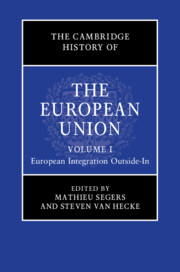Book contents
- The Cambridge History of the European Union
- The Cambridge History of the European Union
- The Cambridge History of the European Union
- Copyright page
- Contents
- Figures
- Contributors to Volume I
- Acknowledgements
- Abbreviations
- Reflections on the History and Historiography of European Integration
- Part I Critical Junctures
- Part II Multilateralism and Geopolitics
- Market, Society and Security
- Global Challenges: International Politics, the Planet and the Universe
- 13 European Integration and the United Nations
- 14 The European Nuclear Dimension: From Cold War to Post-Cold War
- 15 From ‘Helsinki’ and Development Aid to Multipolar Hard Ball
- 16 European Integration, the Environment and Climate Change
- 17 The Space Policy of the European Union
- Part III Perspectives and Ideas
- Index
- References
15 - From ‘Helsinki’ and Development Aid to Multipolar Hard Ball
from Global Challenges: International Politics, the Planet and the Universe
Published online by Cambridge University Press: 21 October 2023
- The Cambridge History of the European Union
- The Cambridge History of the European Union
- The Cambridge History of the European Union
- Copyright page
- Contents
- Figures
- Contributors to Volume I
- Acknowledgements
- Abbreviations
- Reflections on the History and Historiography of European Integration
- Part I Critical Junctures
- Part II Multilateralism and Geopolitics
- Market, Society and Security
- Global Challenges: International Politics, the Planet and the Universe
- 13 European Integration and the United Nations
- 14 The European Nuclear Dimension: From Cold War to Post-Cold War
- 15 From ‘Helsinki’ and Development Aid to Multipolar Hard Ball
- 16 European Integration, the Environment and Climate Change
- 17 The Space Policy of the European Union
- Part III Perspectives and Ideas
- Index
- References
Summary
This chapter argues that the European Communities (EC) and then the European Union (EU) rapidly became an international political actor which, despite the lack of military tools, did not limit its actions to the exercise of soft or civilian power.
Since the 1990s, numerous political scientists have debated the nature of the EU as an international actor, proposing the similar concepts of civilian power, quiet superpower, normative power, transformative power and liberal power. Many debated and reappraised these definitions. In the last 20 years, several historians have added their contributions to studies about the international political role of the EC/EU, revealing how the EC polity increasingly asserted itself as more than just an international economic heavyweight, with some successes, some failures and several limitations.
- Type
- Chapter
- Information
- The Cambridge History of the European Union , pp. 393 - 417Publisher: Cambridge University PressPrint publication year: 2023

